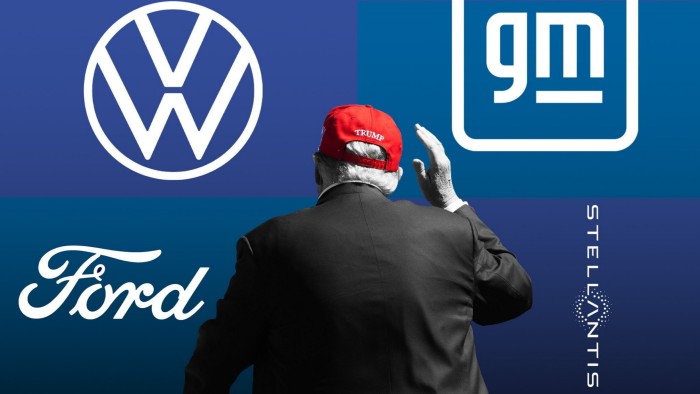Stay informed with free updates
Simply sign up to the US trade myFT Digest — delivered directly to your inbox.
GM, Ford and Chrysler owner Stellantis will be among the carmakers hit hardest by Donald Trump’s pledge to impose tariffs on imports from Mexico and Canada, according to analysts.
The threat to America’s three biggest carmakers stems from the complex, cross-border supply chains the global auto industry has developed over the past four decades.
Since Trump announced plans this week to impose tariffs of 25 per cent on imports from Mexico and Canada, executives and analysts have been trying to work out the potential damage to an industry already confronting weaker demand for electric vehicles.
“While it’s generally understood that a blanket 25 per cent tariff on any vehicles or content from Mexico or Canada could be disruptive, investors under-appreciated how disruptive this could be,” said Dan Levy, an analyst at Barclays.
Which global carmakers are the most exposed?
Mexico and Canada are important manufacturing hubs for carmakers selling vehicles in the US, meaning most of the world’s big manufacturers are vulnerable to the impact of tariffs.
About 40 per cent of the cars and trucks Stellantis sells in the US are imported from Mexico or Canada, according to Bernstein analyst Daniel Roeska. GM’s and Ford’s totals are 30 per cent and 25 per cent respectively.
Unless the companies take steps to mitigate the effect of the tariffs, Barclays estimates that the profits of the three Detroit-based carmakers could be wiped by the levies.
Among European carmakers, Volkswagen is most exposed with 45 per cent of its US sales coming from cars made in Mexico and Canada, although the American market accounts for a small share of the group’s total revenue.
Japan’s Nissan and Honda also make a significant number of cars in Mexico for export to the US.
What could be the fallout on supply chains in Mexico and Canada?
While tariffs on vehicles exported to the US would be painful for the industry, analysts say the bigger danger would be if the Trump administration also imposed tariffs on individual car parts sent from Mexico and Canada.
BNP Paribas analyst James Picariello said tariffs on parts made in Mexico would be devastating. “I don’t think it’s economically feasible,” Picariello said. “At the end of the day, it [the cost of the tariffs] has to land on the consumer.”
Cars assembled in the US rely heavily on parts from Canada and Mexico. According to filings from the National Highway Traffic Safety Administration, just 68 of 141 models recorded as having been assembled in the US had engines and transmissions made in the country.
The figures from the regulator also show that for 42 of the models, parts from Mexico accounted for more than 15 per cent of the total value of the components in the vehicles.
Customs declarations from Mexico show the range of parts the country provides to the US market. About 35,000 declarations covering $700mn of car part shipments were made in the final week of August, the most recent period for which data is available.
Compiled by data company Export Genius, the declarations reveal that purchases by US manufacturers included steering systems, parts that go into EV charging ports and armrests.
A separate set of value-added data, compiled by the OECD, shows that parts from Mexico and Canada accounted for about 10 per cent of the value of cars assembled in the US in 2020, with components from China making up a further 5.4 per cent.
Auto executives say Trump’s plans may also force the industry to rethink its supply chains in other ways.
An executive at a major Japanese automaker said the president-elect could use the threat of tariffs against Mexico and Canada to force carmakers to stop using software and other technologies made in China.
President Joe Biden’s administration has raised tariffs on Chinese imports this year, including a 100 per cent levy on Chinese EVs, despite such vehicles accounting for just 1 per cent of the US EV market last year.
A ban on Chinese software would force western and other Asian carmakers to find new suppliers for the technologies, a significant challenge given the advances Chinese companies have made.
How could companies soften the blow from tariffs?
Carmakers could boost US production, absorb the financial hit by cutting costs or raise prices.
The “Detroit Three” have enough spare capacity in the US to shift production from Mexico and Canada. However, it would be a costlier and more time-consuming exercise for European competitors.
Volkswagen may be able to switch some manufacturing to its new EV plant in South Carolina, where its Scout brand of vehicles is expected to be built. In contrast, BMW and Mercedes-Benz have little spare capacity at their plants in the US.
“Car companies know how to cut [costs] and they have an amazing ability to come back from the edge,” said an executive at a European carmaker.
“I think we are more resilient,” said Michael Leiters, chief executive of British supercar manufacturer McLaren. But he added: “Obviously protectionism and tariffs are not good for the economy at all.”
Read the full article here




